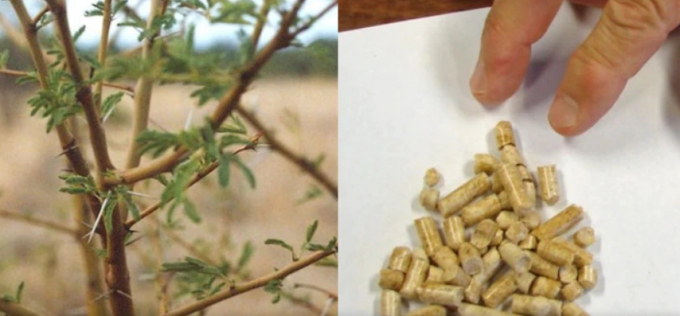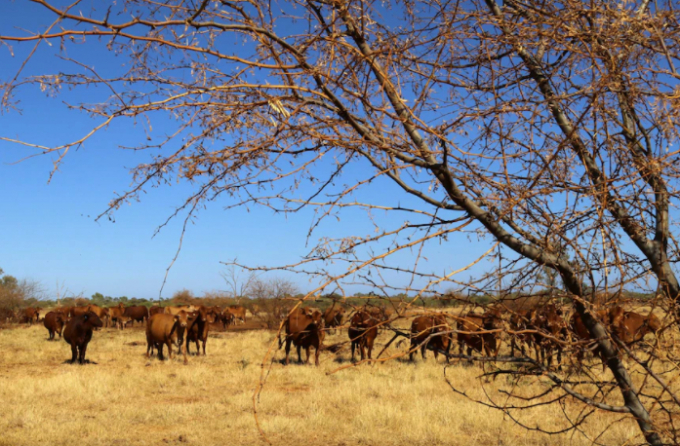November 27, 2025 | 08:00 GMT +7
November 27, 2025 | 08:00 GMT +7
Hotline: 0913.378.918
November 27, 2025 | 08:00 GMT +7
Hotline: 0913.378.918

The renewable energy sector may have found a good use for prickly acacia.Photo: ABC News: Lydia Burton and Rose Grant
You can turn grains and even sugarcane trash into energy, and now there are plans to convert some of Queensland's worst weeds into a new renewable fuel source.
Key points: Invasive weeds could be turned into renewable fuel through the emerging biomass industry; A biomass manufacturer plans to set up three sites across Queensland to produce the alternative fuel source; Prickly acacia is one plant that could be used;
An Australian biomass manufacturer is working on a plan to convert problematic weeds, such as mesquite and prickly acacia, into fuel.
"Biomass is essentially any plant-based material," said Philip Jarratt, the managing director of SEFAAS Proprietary Limited, the company behind the proposed work.
"It can be sugar cane, it can be wheat straw, or it can be forestry waste and residues, or any other type [of] plant material."
Mr Jarratt said the material was then converted into pellets, which could be transformed into renewable fuel.
"A pellet is then blended with coal or used as a 100 per cent substitute to coal," he said.
He said the manufacturer was currently looking at establishing three production sites — in Brisbane, Townsville and Gladstone — with the use of weeds being of particular interest at the Townsville site.
"The invasive weed is a particular feedstock interest for us for the Townsville region at this point in time," Mr Jarratt said.
He said there was especially strong interest in mesquite and prickly acacia.
"There's been a lot of talk about prickly acacia," he said.
AgForce Queensland senior policy officer Marie Vitelli said prickly acacia was an ongoing issue for the agricultural industry, particularly in the north west.
"Prickly acacia is a major curse up in far north-west Queensland and it has also moved down towards the Gulf catchments," Ms Vitelli said.

Mesquite is another weed that could be turned into renewable fuel.Photo: ABC Rural: Eliza Wood
"It's very difficult to manage, especially when it becomes thickened in areas."
Mr Jarratt said he did not anticipate that removing areas of the weed for the purposes of biomass manufacturing would solve the problem for farmers.
However, he said he hoped the work could have some benefits.
"So we're not suggesting at any point that we're the silver bullet or the sole solution; [we're] just happy to be part of the solution," Mr Jarratt said.
"In our way, we focus on what we do and how we'll utilise the [prickly acacia].
"If that allows us to remove some of that infestation from landowners [and] cattle farmers in a way that allows them to regain the productive use of that land, then I think that's a good outcome for the landowner and the resource, and [it's] a viable product for us."
Ms Vitelli said the idea of finding alternative uses for invasive weeds was not a new one, but logistical issues had always gotten in the way.
"Some of this work has been looked at before," she said.
"The main thing is the logistics of processing and where that can be done, and transport costs to where it would be exported or used.
"And that's always been an impediment."
However, she said the work was promising.
"We're seeing a lot of money going into renewable energy, and that would solve a large problem if it's feasible," she said.
"I think many of our western graziers would really welcome prickly acacia becoming a renewable energy resource."
(ABC Net)

(VAN) A new study reveals how the simultaneous effects of ocean acidification, salinity and loss of oxygen are making the world more fragile.

(VAN) Hopes are growing that the creation of the first 3D turkey gut model could be a turning point in the battle against the virulent blackhead disease.

(VAN) Tyson, America’s biggest meat supplier, plans to shutter one of its largest beef processing plants as the industry continues to struggle with low cattle supplies and political pressure from Washington.

(VAN) New FAO study shows how digital solutions are empowering farmers and fishers to prevent losses and build resilient agrifood systems.

(VAN) Brazil's COP30 presidency pushed through a compromise climate deal on Saturday that would boost finance for poor nations coping with global warming but that omitted any mention of the fossil fuels driving it.

(VAN) Poultry farmers in the UK have been warned that they could face one of the worst winters yet for bird flu.

(VAN) Prices of main-crop paddy have risen sharply, with jasmine rice hitting 16,100 baht per tonne — the highest level in years.